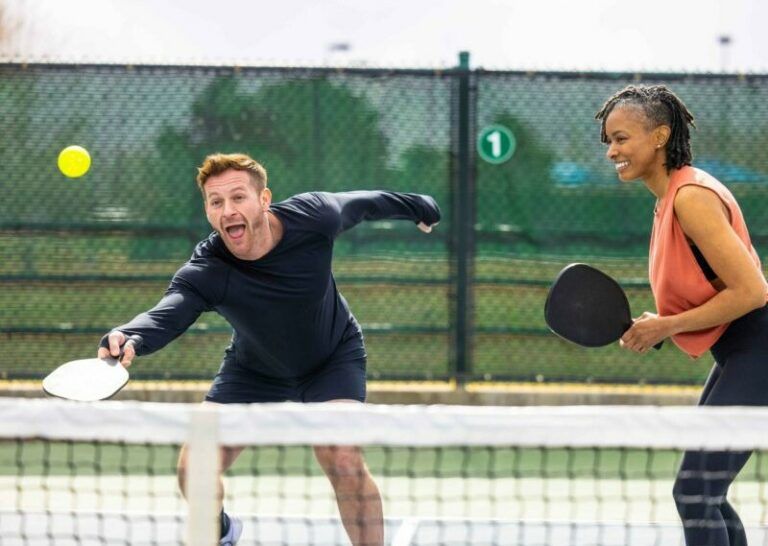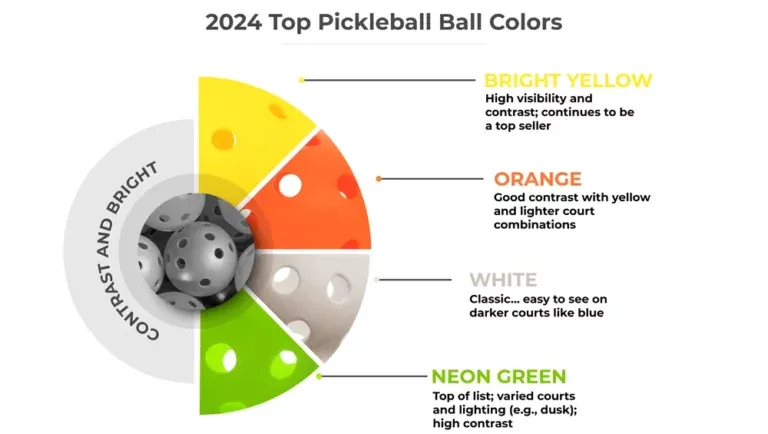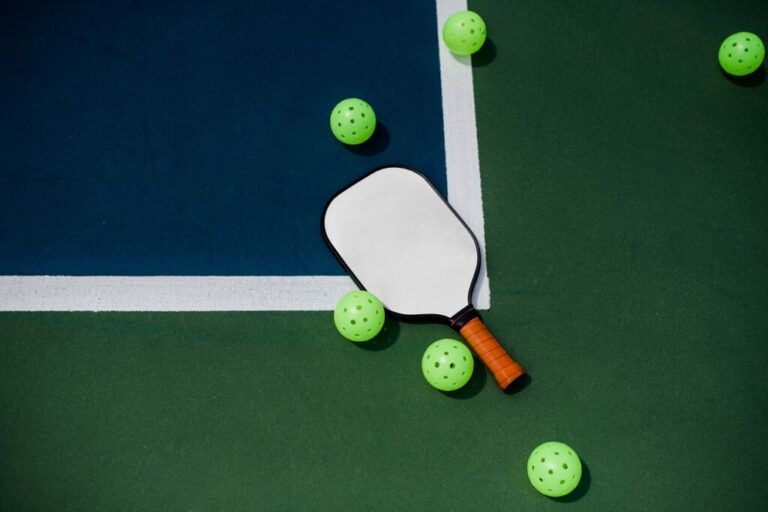Why Pickleball Color Matters: Enhancing Your Game
The Impact on Gameplay
Color is not just a superficial trait; it plays a critical role in how players interact with the pickleball. The hue of the ball directly affects reaction time and shot accuracy. For instance, when players can easily see the ball against the court background, they can anticipate its movement better, allowing for quicker reactions. Studies have shown that high visibility colors like bright yellow enable players to track the ball more efficiently. Consequently, this improved tracking translates into better shot placement and overall gameplay.

Visibility on the Court
Visibility on the court is another essential factor influenced by color. The ability to distinguish the ball from the background is key to effective play. Bright colors, especially those rich in contrast, allow players to track fast-moving balls amid various court settings. As noted in multiple articles on sports psychology, a player’s ability to see the ball clearly is fundamental to performance. This is particularly evident during tournaments where every millisecond counts; thus, picking the right color can serve as a game-changer under competitive circumstances.
Psychological Effects
Colors carry psychological weight as well. Research in psychology has shown that warm colors, such as red and orange, can energize and focus players, while cooler colors, like blue and green, can promote calmness. This psychological effect is vital for players during high-pressure situations. A well-chosen color can not only improve visibility but also support mental fortitude on the court.
The Science Behind Pickleball Colors: Understanding Visibility
Color Perception
Understanding how the human eye perceives color sheds light on why certain shades are preferred in pickleball. In daylight (photopic) conditions, the eye is most sensitive to bright lights, making colors like yellow and neon green particularly effective. Conversely, at nighttime or in dim settings (scotopic conditions), the eye shifts its sensitivity, prompting players to adjust their ball color choices accordingly.

Wavelengths and Visibility
Every color we see corresponds to specific wavelengths of light. For example, colors like yellow and neon green fall within the visible spectrum at wavelengths around 570-580 nm and 520-550 nm, respectively. These specific wavelengths contribute to their exceptional visibility on various surfaces, enhancing players' ability to track the ball during matches, whether on sunny outdoor courts or under artificial indoor lighting.
Contrast Sensitivity
A player's ability to distinguish between similar shades, known as contrast sensitivity, is pivotal for optimal gameplay. For example, a bright yellow ball will remain visible even against more vibrant backgrounds such as grass or darker-themed indoor courts. This distinction can make the difference between a winning shot and a missed opportunity, as players need to recognize and react to the ball's trajectory swiftly.
Standard Pickleball Colors: Yellow and Beyond
The History of Yellow
Historically, yellow has become the standardized color in pickleball, tracing its origins back to tennis. The choice for visibility on television has solidified its status not just in casual leagues but also in competitive tournaments. By making the ball easy to spot, the game is more enjoyable for players and viewers alike.

Advantages of Yellow
Yellow’s high contrast against most court types undoubtedly contributes to its popularity. Whether played indoors on wooden courts or outdoors on grass, yellow balls remain easy to track. The color's vividness in various light conditions ensures it retains optimal visibility, a crucial factor when every point counts.
Alternative Colors
Although yellow is the predominant choice, other colors like orange, green, and even red offer unique advantages depending on specific environmental conditions. Orange, for instance, is highly recommended for indoor play due to its sharp contrast with dark surfaces, while neon green has started to gain traction for its stand-out color against shaded backgrounds.
Choosing the Right Color: Indoor vs. Outdoor Play
Best Colors for Indoor Courts
In indoor games where courts commonly have darker surfaces, white and orange balls are often preferred. This choice helps maintain a high level of visibility and allows players to concentrate without losing track of the ball.
Optimal Colors for Outdoor Courts
For outdoor play, bright yellow and neon green are regarded as optimal options due to their visibility under varying natural light conditions. They stand out against elements like grass, sand, and occasionally overcast skies.

Weather Conditions
Weather can drastically affect visibility, especially during foggy or cloudy days. Under these conditions, colors that carry brightness, like yellow or orange, are more likely to remain distinguishable, ensuring players can still track the ball effectively.
Pickleball Colors and Visual Impairments: Tailored Recommendations
Common Visual Conditions
Players with specific visual impairments, such as color blindness or low vision, face unique challenges when selecting a ball color. Understanding these conditions can help refine color choices, improving gameplay.
Color Suggestions
To aid players with visual impairments, contrasting colors that are easier to distinguish could be recommended. For example, high-contrast colors such as neon green against darker backgrounds may be beneficial for those who struggle with distinguishing some shades.
Expert Perspective
Consulting optometrists and vision specialists can provide valuable insights into how color affects visibility. Their expert recommendations can help players tailor their ball choice based on their visual capabilities, ensuring that everyone can enjoy the game regardless of their visual challenges.
Tournament Regulations and Color Trends
USAPA Rules
The USA Pickleball Association (USAPA) has specific regulations concerning ball colors used in tournaments. These guidelines help standardize play and ensure the game remains accessible for all participants.
Professional Preferences
Professional players often exhibit clear preferences for certain colors based on their gameplay strategies. Observations have indicated that many elite players lean towards colors like yellow, which can enhance their focus and game strategy significantly.
Evolving Trends
Color trends in the sport are continually changing. Monitoring these shifts can reveal insights into player preferences at various levels of play, as well as the successful adoption of newer colors or materials that enhance visibility.
Personalized Color Selection: A New Approach
Visual Acuity Assessment
Creating a self-assessment tool to evaluate visual strengths can help players navigate color choices. This innovation could provide personalized guidance on which colors may optimize their performance based on individual vision characteristics.
Color Recommendation Engine
Developing an interactive tool that suggests the best pickleball colors based on a player’s profile and conditions could revolutionize how enthusiasts choose their balls. This engagement can enhance the experience for casual and serious players alike.
Partnerships with Optometrists
Collaborating with eye care professionals could not only strengthen this initiative but also offer players tailored, expert advice. Doing so could foster a culture of awareness and education around the impact of colors in sports.
Innovative Color Technologies in Pickleball Balls
Latest Advancements
Recent advancements in ball technology, such as the introduction of the Vulcan V-Pro, have led to enhanced visibility features. These innovations allow for a more dynamic gameplay experience, ensuring players can keep their eyes on the ball no matter the circumstances.
Glow-in-the-Dark Balls
For nighttime play, glow-in-the-dark balls offer a unique opportunity to extend the game. Players can enjoy pickleball in varied lighting conditions, further broadening the sport’s accessibility and appeal during evening matches.
Durability and Color Retention
As technology advances, the durability and color retention of pickleball balls are also improving. Players are now able to choose balls that not only perform well but also maintain their vibrancy and visibility over time.
Spectator Experience: Color and Viewership
Impact on TV Viewers
Color choice is also significant for the viewing experience of spectators at home. A ball that is easily visible on-screen can greatly enhance audience engagement, making broadcasts more enjoyable to watch.
Live Events
For spectators at live tournaments, the ability to track the ball closely is crucial. Colors that stand out against the background not only improve the viewing experience but also keep the audience engaged, adding to the tournament's overall atmosphere.
Conclusion
In summary, the significance of color selection in pickleball cannot be overstated. Understanding the interplay between visibility, psychology, and personal preference equips players to make informed decisions that enhance their enjoyment and performance on the court. Always prioritize factors such as environmental conditions, player mood, and personal visual acuity to choose the best pickleball color. Whether you are a seasoned professional or a casual player, selecting the right color can truly optimize your game experience. With the evolving landscape of pickleball and its colors, each player has the opportunity to elevate their performance and immerse themselves fully in this fantastic sport.








